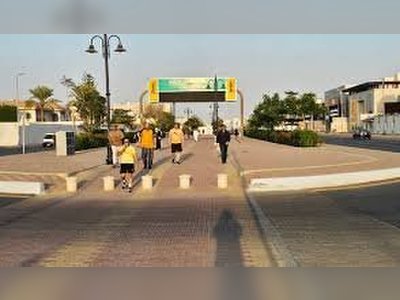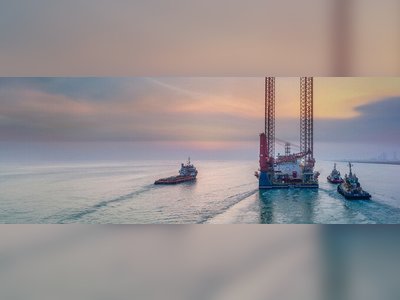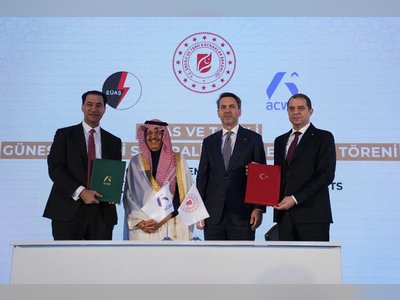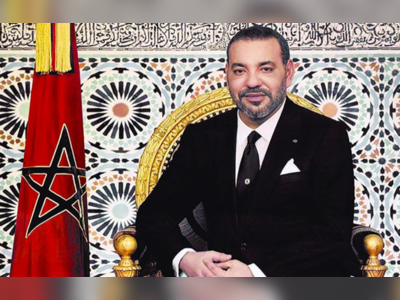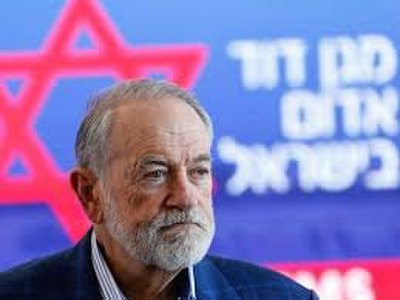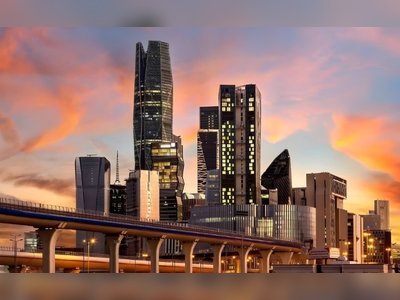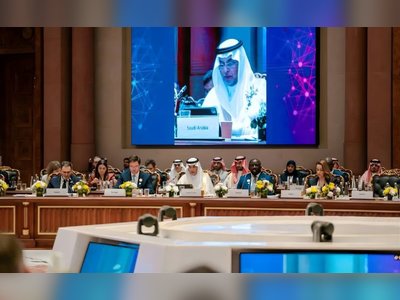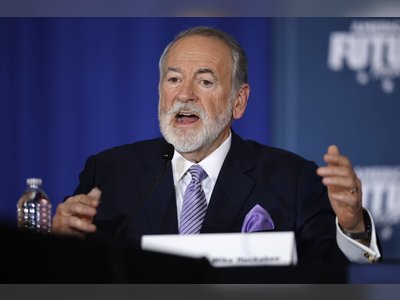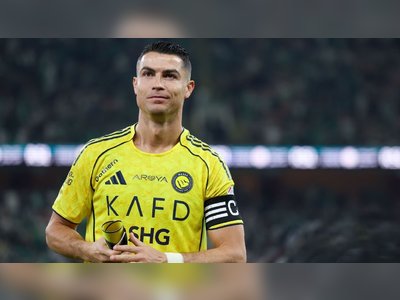
Ukraine war: Israel treads careful line as public blames Russia
While PM Bennett is trying to mediate peace, many Israelis with backgrounds in former Soviet nations are against Moscow’s invasion.
At a cafe in central Jerusalem, a middle-aged couple, Leonid from Belarus and Olga from Dagestan, discussed the war in Ukraine over coffee and bourekas.
“As Jews, we have often wondered about this: how it was possible that in Germany, a whole nation became zombified by propaganda,” said Leonid, an online entrepreneur, referring to Russia.
“Turns out it’s completely possible, even now, in the age of the internet. It’s like they’re living in the Matrix, an alternative reality.”
A young Israeli language student interrupted the conversation, eager to practise his Russian. Soon the conversation drifted towards war, and the student, uneasily trying not to offend, offered what he thought was a balanced view.
“It’s terrible, of course, what Russia has begun, but the Ukrainians were wrong, too, when they tried to ban the Russian language,” he said, bringing up a contentious issue that has led to fist fights between Ukrainian MPs.
“What nonsense!” Olga blurted out. “I was in Kyiv last summer and everyone there only spoke Russian!”
Olga and Leonid are Israeli citizens who made Aliyah (immigrated to Israel) in the 1990s.
Under Israel’s Law of Return, anyone in the world with at least one Jewish grandparent is eligible for citizenship.
After the fall of communism, more than a million Jews from the former Soviet Union immigrated, changing the demographics of the entire country.
Unlike earlier arrivals from North Africa or the Middle East, Soviet Jews tended to be less religious and leaned more to the right, politically.
They now make up about a fifth of Israel’s population and spend a lot of time fearfully watching the war between Russia and Ukraine unfold.
“This conflict for me is very personal,” said 32-year-old Alexey in Haifa, who has had Israeli citizenship for years and is currently unemployed.
His mother is from Kyiv while his father is from Moscow, where he spent most of his life.
“It’s as if there was a rift in my own family, although my parents are both against the invasion. It’s very hard and I’d like to forget about it and think of it as a bad dream,” he told Al Jazeera.
“I’ll never forget the morning of February 24, because I thought to the last minute that [Russian President Vladimir] Putin would have enough sense not to start this war and solve these problems some other way. It’s no wonder Russia is being compared to the Nazis and they [the Russian leadership] need to answer for what they’ve done, maybe not in Nuremberg but in The Hague.
“Sooner or later Russia will lose this war, and the guilty will be punished.”
Putin has often made a Nazi comparison, but his is aimed at the Ukrainian government led by President Volodymyr Zelenskyy.
A stated aim of Putin’s “special military operation”, as it is offic is the “de-Nazification” of Ukraine.
In his view, the Ukrainian government is overrun by far-right ultra-nationalists following in the footsteps of Nazi collaborators of World War II, who were planning or executing a genocide of the Russian-speaking people of the Donbas.
Recently, Russian Foreign Minister Sergey Lavrov claimed that Adolf Hitler had Jewish origins, provoking uproar in Israel. Putin personally called Israeli Prime Minister Naftali Bennett to apologise.
“Yes there may be some Nazis [in Ukraine] but they’re everywhere, in every country, and I think there’s no less of them in Russia,” said Alexey. “I think it’s clear that what’s happening is a genocide. I have no other words with which to describe this,” he continued, referring to Russia’s war in Ukraine.
Not everyone would use that expression, and Zelenskyy irked Israeli leaders in March by comparing war crimes committed during the Russian invasion with the Holocaust.
But overall, most Israelis do not appear sympathetic to Putin’s “de-Nazification” reasoning.
Israel’s main Holocaust museum, Yad Vashem, has condemned the Russian invasion.
According to a survey published in late March – which asked former Soviet immigrants and Israeli-born citizens, including Palestinian citizens of Israel, more than two-thirds blamed the Russian government for starting the war.
Meanwhile, Israelis with military experience and training from their service in the Israeli army have volunteered to fight on the Ukrainian side.
At the diplomatic level, Israel’s right-wing nationalist prime minister, Naftali Bennett, has positioned himself as a peacemaker and is among the world leaders trying to mediate a Putin-Zelenskyy meeting.
But Bennett has been criticised for not being hard enough on Putin, and refusing to sell the Iron Dome defence system to Ukraine.
Israel has held back from imposing sanctions on Russia and did not condemn Russia at the UN Security Council, though it has condemned the Kremlin’s war.
Israel has also dispatched humanitarian aid to Ukraine and welcomed tens of thousands of refugees, although there is a brewing controversy over how long non-Jewish refugees will be allowed to stay.
And while Israeli citizens have been evacuated from the war zone, Palestinian students studying in Kyiv were left stranded as they had no passports.
According to international relations expert Yonatan Freeman at the Hebrew University of Jerusalem, Israel finds itself in a delicate position, because of its large ex-Soviet population and amid continuing conflicts in the Middle East.
“With the current crisis there have been two main camps concerning whether Israel should take a side between Russia and Ukraine,” he told Al Jazeera. “One major camp has declared we need to maintain neutrality, because of the weight of relations with Moscow. Israel is concerned that a greater distance between Jerusalem and Moscow may cause the latter to be more indifferent to Israel’s security concerns at home and abroad.
“Bennett wants Russia to continue to be understanding of Israel’s activities in Syria and to be open to hearing our concerns on Iran. Israel also wants to make sure the large Jewish population in Russia continues to be seen in good light and that links to Israel, including by air, continue.”
Israel has carried out air strikes on the Lebanese group – and Russia’s ally in Syria – Hezbollah, which is backed by Iran, another country close to Moscow.
Back at the cafe in Jerusalem, Olga bemoaned the divisions within her personal network.
“I have a childhood friend from Donbas, and she is the only one in our circle who’s still saying ‘Glory to Russia!’ And she’s wondering why none of us want to talk to her,” she said.
Alexey added: “Of my friends who don’t support Russian aggression, those who can have left [Russia], but not everyone can because they have jobs, families, and so on. There are unfortunately a few people very close to me whom I know from my childhood who are for this, and I don’t want to spoil relations with them so I try not to bring it up.
“Their human qualities are still dear to me but while this is all happening, I’ll think I’ll keep my distance from them.”
For now, Leonid, Olga and Alexey will continue to closely watch the latest news from the front.
“I’m really afraid now, I don’t know what will happen,” Leonid said. “In Ukraine, they will chase [the Russians] all the way to the border, but [Putin] doesn’t know how to lose.”
“As Jews, we have often wondered about this: how it was possible that in Germany, a whole nation became zombified by propaganda,” said Leonid, an online entrepreneur, referring to Russia.
“Turns out it’s completely possible, even now, in the age of the internet. It’s like they’re living in the Matrix, an alternative reality.”
A young Israeli language student interrupted the conversation, eager to practise his Russian. Soon the conversation drifted towards war, and the student, uneasily trying not to offend, offered what he thought was a balanced view.
“It’s terrible, of course, what Russia has begun, but the Ukrainians were wrong, too, when they tried to ban the Russian language,” he said, bringing up a contentious issue that has led to fist fights between Ukrainian MPs.
“What nonsense!” Olga blurted out. “I was in Kyiv last summer and everyone there only spoke Russian!”
Olga and Leonid are Israeli citizens who made Aliyah (immigrated to Israel) in the 1990s.
Under Israel’s Law of Return, anyone in the world with at least one Jewish grandparent is eligible for citizenship.
After the fall of communism, more than a million Jews from the former Soviet Union immigrated, changing the demographics of the entire country.
Unlike earlier arrivals from North Africa or the Middle East, Soviet Jews tended to be less religious and leaned more to the right, politically.
They now make up about a fifth of Israel’s population and spend a lot of time fearfully watching the war between Russia and Ukraine unfold.
“This conflict for me is very personal,” said 32-year-old Alexey in Haifa, who has had Israeli citizenship for years and is currently unemployed.
His mother is from Kyiv while his father is from Moscow, where he spent most of his life.
“It’s as if there was a rift in my own family, although my parents are both against the invasion. It’s very hard and I’d like to forget about it and think of it as a bad dream,” he told Al Jazeera.
“I’ll never forget the morning of February 24, because I thought to the last minute that [Russian President Vladimir] Putin would have enough sense not to start this war and solve these problems some other way. It’s no wonder Russia is being compared to the Nazis and they [the Russian leadership] need to answer for what they’ve done, maybe not in Nuremberg but in The Hague.
“Sooner or later Russia will lose this war, and the guilty will be punished.”
Putin has often made a Nazi comparison, but his is aimed at the Ukrainian government led by President Volodymyr Zelenskyy.
A stated aim of Putin’s “special military operation”, as it is offic is the “de-Nazification” of Ukraine.
In his view, the Ukrainian government is overrun by far-right ultra-nationalists following in the footsteps of Nazi collaborators of World War II, who were planning or executing a genocide of the Russian-speaking people of the Donbas.
Recently, Russian Foreign Minister Sergey Lavrov claimed that Adolf Hitler had Jewish origins, provoking uproar in Israel. Putin personally called Israeli Prime Minister Naftali Bennett to apologise.
“Yes there may be some Nazis [in Ukraine] but they’re everywhere, in every country, and I think there’s no less of them in Russia,” said Alexey. “I think it’s clear that what’s happening is a genocide. I have no other words with which to describe this,” he continued, referring to Russia’s war in Ukraine.
Not everyone would use that expression, and Zelenskyy irked Israeli leaders in March by comparing war crimes committed during the Russian invasion with the Holocaust.
But overall, most Israelis do not appear sympathetic to Putin’s “de-Nazification” reasoning.
Israel’s main Holocaust museum, Yad Vashem, has condemned the Russian invasion.
According to a survey published in late March – which asked former Soviet immigrants and Israeli-born citizens, including Palestinian citizens of Israel, more than two-thirds blamed the Russian government for starting the war.
Meanwhile, Israelis with military experience and training from their service in the Israeli army have volunteered to fight on the Ukrainian side.
At the diplomatic level, Israel’s right-wing nationalist prime minister, Naftali Bennett, has positioned himself as a peacemaker and is among the world leaders trying to mediate a Putin-Zelenskyy meeting.
But Bennett has been criticised for not being hard enough on Putin, and refusing to sell the Iron Dome defence system to Ukraine.
Israel has held back from imposing sanctions on Russia and did not condemn Russia at the UN Security Council, though it has condemned the Kremlin’s war.
Israel has also dispatched humanitarian aid to Ukraine and welcomed tens of thousands of refugees, although there is a brewing controversy over how long non-Jewish refugees will be allowed to stay.
And while Israeli citizens have been evacuated from the war zone, Palestinian students studying in Kyiv were left stranded as they had no passports.
According to international relations expert Yonatan Freeman at the Hebrew University of Jerusalem, Israel finds itself in a delicate position, because of its large ex-Soviet population and amid continuing conflicts in the Middle East.
“With the current crisis there have been two main camps concerning whether Israel should take a side between Russia and Ukraine,” he told Al Jazeera. “One major camp has declared we need to maintain neutrality, because of the weight of relations with Moscow. Israel is concerned that a greater distance between Jerusalem and Moscow may cause the latter to be more indifferent to Israel’s security concerns at home and abroad.
“Bennett wants Russia to continue to be understanding of Israel’s activities in Syria and to be open to hearing our concerns on Iran. Israel also wants to make sure the large Jewish population in Russia continues to be seen in good light and that links to Israel, including by air, continue.”
Israel has carried out air strikes on the Lebanese group – and Russia’s ally in Syria – Hezbollah, which is backed by Iran, another country close to Moscow.
Back at the cafe in Jerusalem, Olga bemoaned the divisions within her personal network.
“I have a childhood friend from Donbas, and she is the only one in our circle who’s still saying ‘Glory to Russia!’ And she’s wondering why none of us want to talk to her,” she said.
Alexey added: “Of my friends who don’t support Russian aggression, those who can have left [Russia], but not everyone can because they have jobs, families, and so on. There are unfortunately a few people very close to me whom I know from my childhood who are for this, and I don’t want to spoil relations with them so I try not to bring it up.
“Their human qualities are still dear to me but while this is all happening, I’ll think I’ll keep my distance from them.”
For now, Leonid, Olga and Alexey will continue to closely watch the latest news from the front.
“I’m really afraid now, I don’t know what will happen,” Leonid said. “In Ukraine, they will chase [the Russians] all the way to the border, but [Putin] doesn’t know how to lose.”


